The Ultimate Guide to Developing Your CWI Career Path
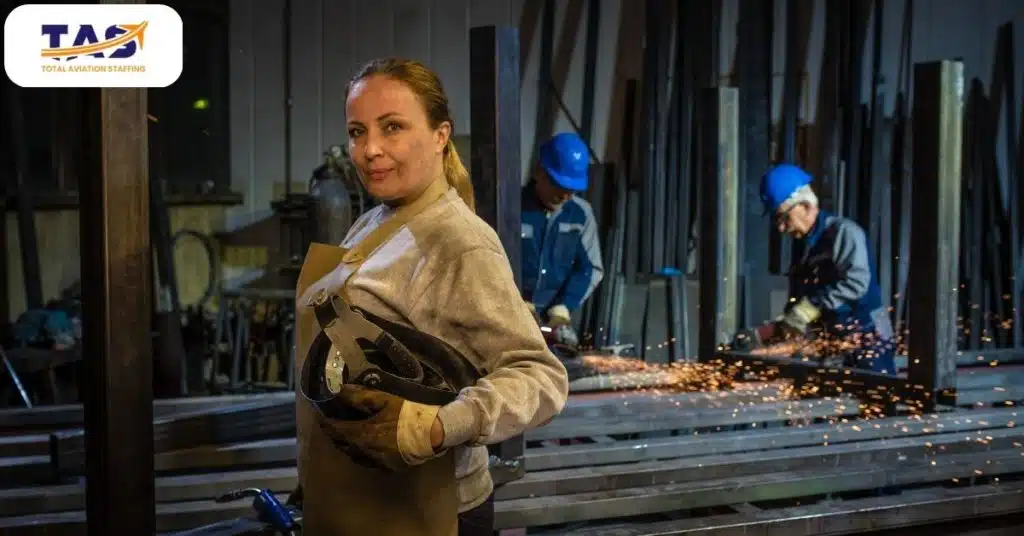
Are you interested in pursuing a career in aviation as a Certified Welding Inspector (CWI)? Look no further than this Ultimate Guide, which will provide you with all the information you need to develop and advance your CWI career.
As the aviation industry continues to grow, the demand for highly skilled professionals like CWIs will only increase. This guide will cover the skills and requirements needed for a successful CWI career, the different stages of advancement, tips for success, and common challenges to overcome.
Whether you’re just starting your career or looking to take the next step, this guide has something for every aspiring CWI in the aviation industry.
Understanding the CWI Career Path
Becoming a Certified Welding Inspector (CWI) in the aviation industry is an excellent career path for those interested in ensuring the structural integrity of aerospace manufacturing components. With a minimum of five years of experience in a manufacturing environment, specifically in weld/fab positions, and current AWS CWI certification, CWIs are responsible for inspecting 100% of the structural welds performed and ensuring compliance with the company’s procedures and customer requirements.
As they progress in their careers, CWIs can develop specialized knowledge of aerospace manufacturing processes and quality requirements, gain proficiency in blueprint reading and standard welding symbols, and hone their communication and project management skills.
With competitive salaries, excellent benefits, and opportunities for travel and advancement, a CWI career in aviation offers a challenging and rewarding path for those passionate about quality control and quality assurance.
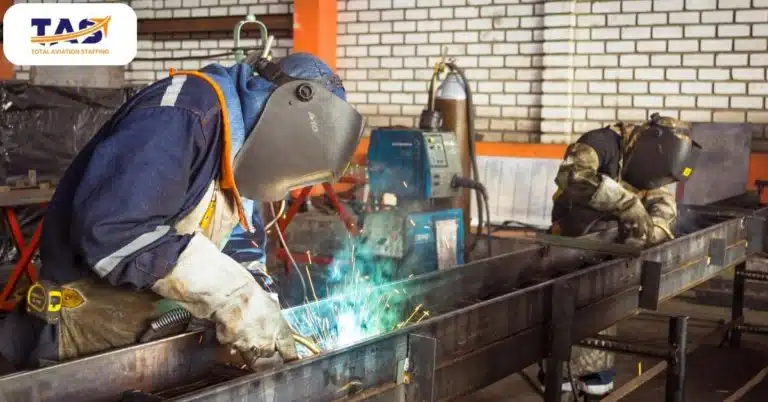
Skills and Requirements for a CWI Career
Becoming a Certified Welding Inspector (CWI) in the aviation industry is an excellent career path for those with a keen eye for detail, strong technical knowledge, and a passion for ensuring quality in the production process.
However, it’s essential to understand the skills and requirements necessary for success in this career path, it includes:
A current AWS CWI certification is mandatory for this position.
A minimum of 5 years of experience in a manufacturing environment is preferred, particularly in weld/fab positions.
Knowledge of aerospace manufacturing processes and quality requirements is a plus.
Ability to read and understand American Welding Standards (AWS) and customer-specific standards regarding welding.
Familiarity with blueprint reading, standard welding symbols and requirements, and GD&T symbols and terminology.
Strong verbal and written communication skills are essential.
High attention to detail and ability to manage multiple priorities with competing deadlines.
Proficiency with Microsoft Office (Excel, Word, PowerPoint) is required.
Physical demands include sitting, climbing, balancing, stooping, kneeling, crouching, or crawling, as well as lifting and moving up to 10 pounds and occasionally up to 35 pounds.
A career as a CWI in the aviation industry can be both challenging and rewarding, requiring a combination of technical expertise, attention to detail, and strong communication skills. With the continued growth of the aerospace and defense industries, there is an increasing demand for qualified CWIs to ensure the safety and reliability of aircraft components. If you have a passion for welding and a commitment to quality, a career as a CWI in aviation may be the right path for you.
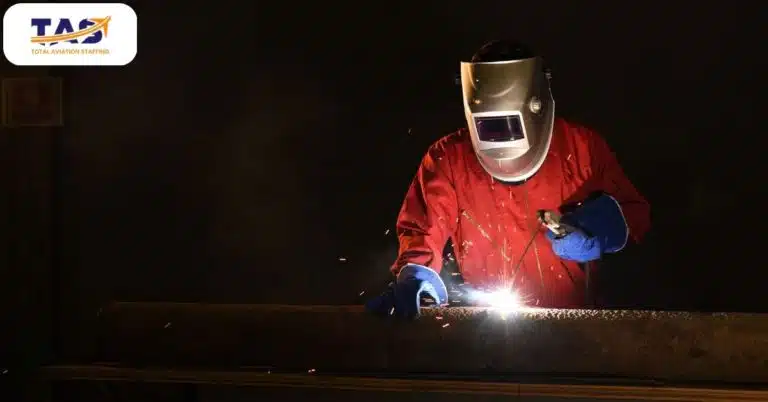
The Different Stages of a CWI Career
A CWI (Certified Welding Inspector) career in aviation can be a rewarding and fulfilling profession. It offers a wide range of opportunities for growth and development as one advances through different stages of their career.
Various stages of a CWI career in aviation and what it takes to succeed in each stage:
Entry-Level: This stage is characterized by gaining experience and acquiring the necessary skills and knowledge to become a successful CWI. It involves working under the supervision of experienced inspectors and mastering the basics of welding inspection, testing, and quality control.
Mid-Level: At this stage, a CWI has gained several years of experience and developed a strong foundation of skills and knowledge. They are expected to take on more responsibilities, such as training and supervising entry-level inspectors, conducting advanced inspections, and leading projects.
Senior-Level: This stage involves becoming a subject matter expert in a particular area of welding inspection and taking on leadership roles. Senior-level CWIs are responsible for developing and implementing new inspection processes, improving the quality of inspection programs, and mentoring and coaching other inspectors.
So, whether you’re just starting as an entry-level CWI in aviation or you’re a seasoned senior-level expert, there are always opportunities to learn, grow, and advance in your career. With hard work, dedication, and a passion for excellence, you can achieve great success as a Certified Welding Inspector in the aviation industry. Remember, as a CWI, you hold a vital role in ensuring the safety and quality of aircraft and their components, making it a truly rewarding and fulfilling profession.
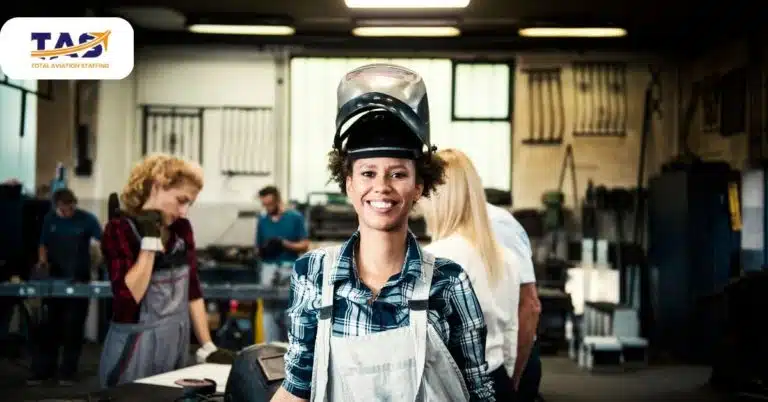
How to Build Your CWI Skill Set
If you are interested in pursuing a career as a Certified Welding Inspector (CWI) in aviation, it is essential to build and enhance your skill set to achieve success in this field. While having relevant education and experience is crucial, there are several ways to further develop your abilities and grow your career.
Here are some tips to help you build your CWI skill set:
Get certified: Obtaining a CWI certification from a recognized organization is crucial to enter this field.
Keep up with industry trends: Stay up-to-date with the latest advancements in welding technology, industry trends, and regulations.
Attend workshops and training sessions: Attend welding workshops, seminars, and training sessions to improve your skills and gain knowledge about different welding processes, techniques, and equipment.
Gain hands-on experience: Work in manufacturing environments, where you can get hands-on experience and build your practical skills in welding and fabrication.
Learn new skills: Develop additional skills such as blueprint reading, knowledge of welding symbols, and geometric dimensioning and tolerancing (GD&T) to enhance your versatility and make yourself more marketable.
Network: Build a network of professional contacts by attending industry events, joining professional organizations, and connecting with other professionals in the field.
Building a successful career as a Certified Welding Inspector in aviation requires dedication, continuous learning, and a commitment to excellence. By following the tips we’ve discussed, you can establish a strong foundation for your career and create new opportunities for growth and advancement. Remember that your role as a CWI is essential to ensuring the safety and quality of aircraft, making it a highly rewarding and impactful profession. So, stay focused, keep learning, and soar to new heights in your CWI career in aviation!
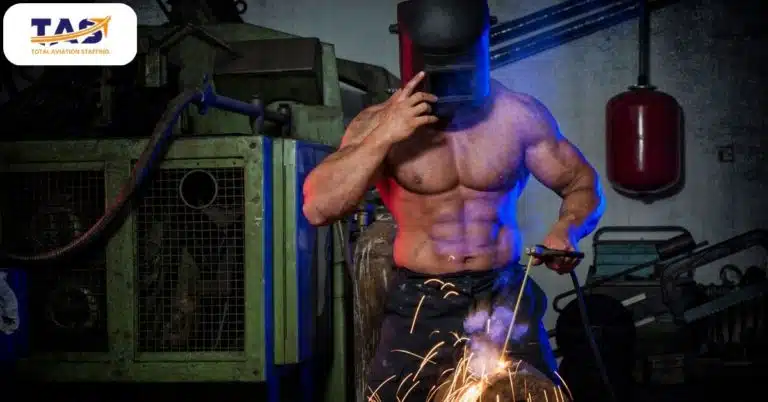
CWI Career Advancement and Growth Opportunities
The aviation industry is full of opportunities for CWIs to grow and advance their careers. With paths ranging from working on the shop floor to managing an entire department, the sky’s the limit when it comes to career advancement.
Various career opportunities available to CWIs in aviation:
Continual Education: To advance in the field, CWIs should pursue continuing education and training to stay up to date with the latest technology, regulations, and industry standards.
Specialization: CWIs can specialize in a particular type of welding, such as TIG, MIG, or spot welding, to become an expert in their field.
Management Opportunities: With experience and leadership skills, CWIs can move into management roles, overseeing a team of inspectors or managing an entire welding department.
Quality Control: CWIs can also move into quality control positions, where they ensure that all welding meets industry standards and regulations.
Consulting: Some experienced CWIs may choose to become consultants, offering their expertise to various companies and organizations.
Whether you’re looking to specialize in a particular type of welding, take on a leadership role, or simply expand your skill set, the opportunities for career growth and advancement as a Certified Welding Inspector in aviation are endless. By pursuing continuing education and training and honing your leadership and management skills, you can take your career to new heights and tackle exciting new challenges in the field.
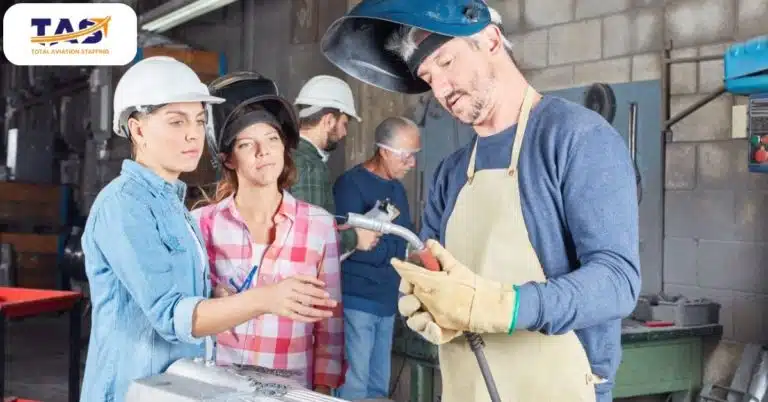
Tips for Pursuing a Successful CWI Career
Becoming a Certified Welding Inspector (CWI) in aviation is a great career choice for those who have a passion for welding and aviation. However, like any other profession, there are specific tips that can help you excel and succeed in your CWI career.
Top tips for pursuing a successful CWI career:
Develop a strong foundation in welding knowledge and skills before pursuing a CWI certification.
Stay up to date with the latest advancements and technologies in the welding industry.
Network with other professionals in the aviation industry to gain insight and build relationships.
Seek out professional development opportunities to enhance your skills and knowledge, such as attending conferences or taking additional courses.
Continuously strive to improve your communication and interpersonal skills, as they are essential in building relationships with clients and colleagues.
Embrace a commitment to safety, ensuring that all welding work is conducted following safety standards and regulations.
Maintain a high level of attention to detail and accuracy in your work, as even small errors can have significant consequences in aviation welding.
As a Certified Welding Inspector in aviation, you have the potential for a successful and fulfilling career. By implementing the tips we’ve discussed and staying dedicated to your professional development, you can position yourself for long-term success in this exciting field. Remember, in welding, there’s always more to learn and new skills to develop, so never stop pursuing knowledge and refining your craft. With hard work, determination, and a passion for excellence, you can achieve great success as a CWI in aviation. Keep learning and keep soaring to new heights in your career!
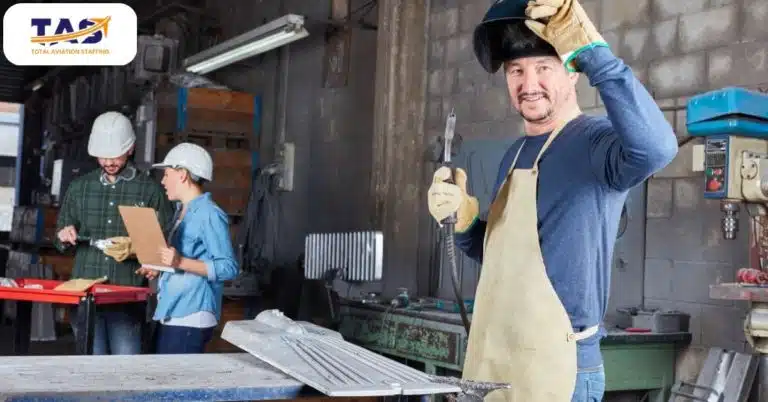
Common Challenges Faced in a CWI Career
A career as a Certified Welding Inspector (CWI) in the aviation industry can be challenging yet rewarding. Like any career, certain challenges come with the job. Being aware of these challenges can help you prepare and navigate your career more effectively. In this article, we will discuss some common challenges faced by CWIs in aviation and provide tips on how to overcome them. Whether you are a new or seasoned CWI, these insights can help you navigate your career and achieve success.
Some common challenges faced in a CWI career in aviation include:
Keeping up with industry standards and regulations
Managing a high workload and tight deadlines
Dealing with difficult coworkers or clients
Balancing safety and efficiency
Staying up to date with technological advancements in welding and inspection techniques
When you acknowledge and prepare for common challenges you can navigate your career more effectively and achieve greater success. Remember, with dedication, hard work, and a commitment to excellence, you can overcome any challenge and thrive in your CWI career in aviation. So keep pushing forward, stay focused, and reach for the skies in your professional journey!
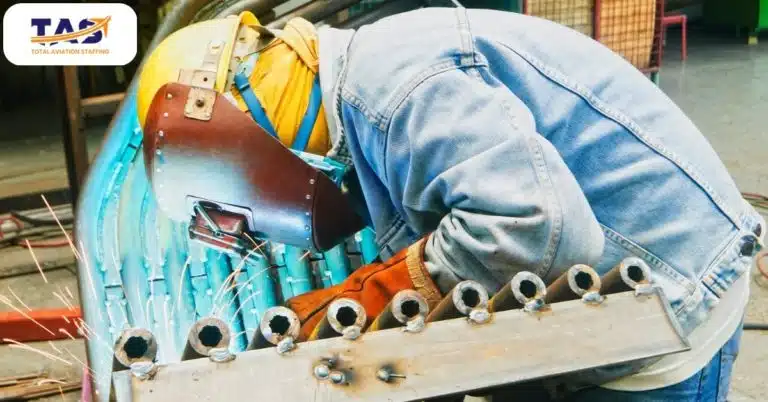
Resources to Help Develop Your CWI Career Path
If you’re pursuing a career as a Certified Welding Inspector (CWI) in aviation, you might be wondering what resources are available to help you develop your career path. Fortunately, there are numerous resources available to help you achieve your professional goals and advance in your career.
Sample resources to help develop your CWI Career Path:
Professional Associations: Joining professional organizations such as the American Welding Society (AWS) can provide access to networking opportunities, industry events, and educational resources.
Training Programs: Many technical schools and community colleges offer training programs that can help prepare individuals for a CWI career in aviation.
Certifications: In addition to becoming a CWI, pursuing additional certifications such as the Nondestructive Testing (NDT) Level II certification can help broaden career opportunities.
Mentorship Programs: Seeking out experienced professionals in the industry who are willing to offer guidance and advice can be a valuable resource for career development.
Continuing Education: Staying up to date on industry advancements and changes through continuing education courses and workshops can help individuals maintain a competitive edge in their careers.
Utilizing the resources available to you can help you achieve your goals and advance in your career. Whether it’s joining a professional association, attending training programs, or finding a mentor, there are many ways to develop your skills and knowledge as a CWI in aviation.
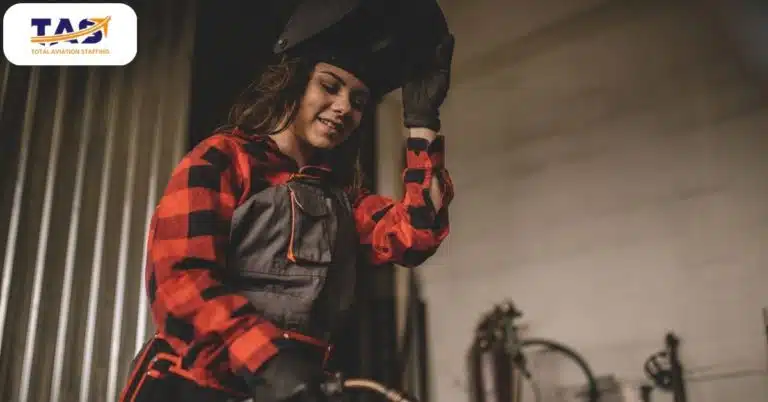
What the Future Holds for CWI Professionals
The future looks bright for CWI professionals in aviation as the demand for skilled workers in the industry continues to grow. With advancements in technology and an increased focus on safety, there will be a need for CWIs to ensure that all aircraft components meet the necessary standards.
Additionally, as the aviation industry becomes more global, there will be opportunities for CWIs to work on international projects and collaborate with professionals from different parts of the world. As the industry evolves, CWIs will need to stay up-to-date with the latest technologies and regulations to remain competitive.
The future of the CWI profession in aviation is promising, and those who have the skills and knowledge to succeed will be in high demand.
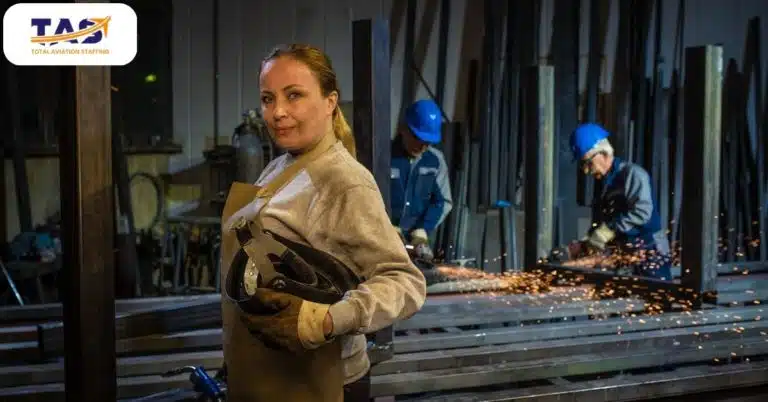
In Conclusion
A career as a CWI in aviation is both challenging and rewarding. By following the steps outlined in this guide, you can build the necessary skills, navigate the various stages of your career, and overcome common challenges to achieve success. Remember to take advantage of available resources and always be open to learning and growing in your profession. With dedication and perseverance, you can reach new heights in your CWI career path in aviation!
Ready to take your CWI career in aviation to new heights? Don’t wait any longer – start exploring job opportunities today with Total Aviation Staffing! Our team of experts can help connect you with top companies in the industry and provide guidance to enhance your resume and job search. Take control of your future and land your dream job as a CWI. Visit our website and contact us today to get started!
